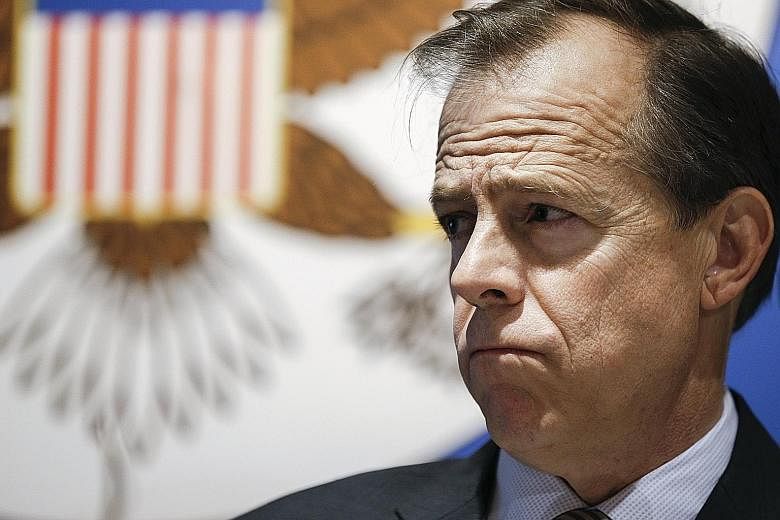The new United States ambassador to Thailand is under probe for alleged lese majeste over comments that he made at an event in Bangkok last month.
Mr Glyn Davies, who took up his post in September, had triggered protests by royalists in the kingdom after he raised concern over recent lese majeste convictions during a talk at the Foreign Correspondents' Club of Thailand (FCCT) on Nov 25.
Thai police yesterday confirmed that an investigation was under way, though it is unclear how far the probe can go, given the diplomatic immunity that the ambassador holds.
"He has not been charged yet by the Thai authority since an investigation into the case is ongoing," deputy national police spokesman Kissana Phathanacharoen told The Straits Times.
FCCT president Jonathan Head said it had been asked by Thai police to assist with the probe.
"The FCCT is cooperating with the police," he said in a statement. The full recording of the ambassador's remarks is available on YouTube.
The US Embassy did not respond to The Straits Times' queries.
Thailand's lese majeste law has long been a contentious subject. While royalists think it is necessary to protect the revered King Bhumibol Adulyadej and his family from indignity, critics say the law is often abused for political ends.
A person found to have defamed or insulted the Thai monarchy can be jailed for up to 15 years on each count. Suspects are rarely granted bail.
Anyone can file a lese majeste complaint, and the police are obliged to investigate every case.
Under the military government, which came to power through a coup in May last year, lese majeste suspects have been tried in military courts instead of civilian ones. Also, there has been a spike in the number of prosecutions as well as severity of sentences.
In August, a man was jailed for 30 years for insulting the monarchy on Facebook. About a month ago, two lese majeste suspects died separately in military custody.
Mr Davies - who had filled a seat left vacant for almost 10 months amid increasing curbs on civil liberties in Thailand that tested bilateral relations - had said during his speech at the FCCT: "We're also concerned by the lengthy and unprecedented prison sentences handed down by Thai military courts against civilians for violating the lese majeste law."
While stressing that Americans respect and admire King Bhumibol, the ambassador added: "We believe no one should be jailed for peacefully expressing their views and we strongly support the ability of individuals and independent organisations to research and to report on important issues without fear of retaliation."
His comments triggered protests by royalists in the capital Bangkok, Chiang Mai and several other provinces.
The protesters, who had rallied without incident in spite of the junta's ban on political gatherings, accused Mr Davies of interfering in Thailand's domestic affairs.
On Dec 3, Mr Sonthiya Sawasdee, who reportedly belongs to a royalist group called Federation To Monitor The Thai State, filed a police complaint against Mr Davies for alleged lese majeste at the Crime Suppression Division in Bangkok. A Facebook account under his name carried a copy of the police complaint.

